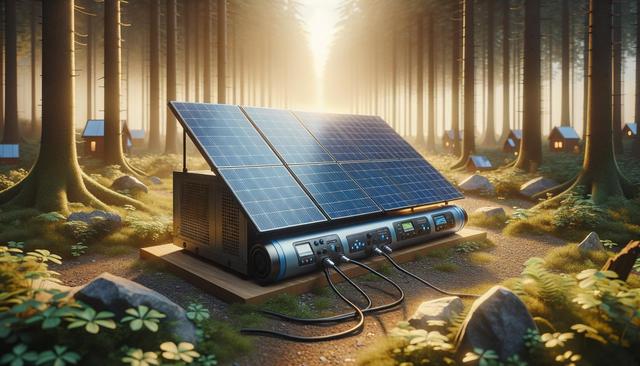What Is a Solar Generator and How Does It Work?
A solar generator is a portable power system that combines solar panels, a battery, an inverter, and a charge controller to store and convert energy from the sun. Unlike traditional fuel-powered generators, a solar powered generator operates quietly and without emissions, making it an eco-friendly alternative for various energy needs. These systems capture energy from sunlight via photovoltaic panels, store it in a battery, and then convert it into usable electricity through an inverter. This process allows users to power household appliances, tools, or mobile devices without relying on the grid.
The key components of a typical solar power generator include:
- Solar panels – for capturing sunlight
- Battery pack – for storing energy
- Inverter – to convert stored DC power to AC for standard appliances
- Charge controller – to regulate the flow of electricity and prevent battery overcharging
Solar generators are especially useful for outdoor activities, emergency preparedness, and for anyone looking to reduce their dependence on fossil fuels. They are also gaining popularity as a backup energy source for homes, particularly in areas prone to power outages.
Types of Solar Generators and Their Applications
There are different types of solar generators available, each suited to specific use cases. The most common categories include portable solar generators and solar generator systems for home use. Portable units are compact and lightweight, making them ideal for camping, RV trips, or outdoor job sites. These typically offer enough power to charge smartphones, laptops, and small electric appliances.
On the other hand, a solar generator for home use is designed to provide more substantial power output, capable of running larger appliances such as refrigerators, lights, or even medical devices during outages. These systems often feature more robust battery storage and higher wattage inverters.
Applications of solar powered generators include:
- Emergency backup power during blackouts
- Off-grid living and remote cabins
- Outdoor recreation and travel
- Sustainable energy solutions for everyday household use
Understanding the intended application will help determine the right model and capacity needed for effective performance.
Advantages of Using a Solar Generator
One of the most notable benefits of using a solar generator is its environmental impact. Unlike fuel-based generators, solar generators produce no emissions, contributing to cleaner air and reduced carbon footprint. This makes them a suitable choice for eco-conscious consumers and those looking to adopt sustainable energy practices.
Other advantages include:
- Quiet operation – no engine noise
- Low maintenance – fewer moving parts compared to gas-powered units
- Renewable energy source – reliant only on sunlight
- Cost-effective over time – no fuel costs or frequent servicing
For homeowners, integrating a generator and solar power system can enhance energy security and reduce reliance on traditional utilities. It can also be a practical investment in areas with unstable power infrastructure or frequent natural disasters.
Limitations and Considerations
Despite their many benefits, solar generators are not without limitations. One of the main considerations is the initial cost. High-capacity systems suitable for comprehensive home energy support can be expensive upfront, although long-term savings on energy bills often offset this cost.
Other factors to consider include:
- Charging time – depends on sunlight availability and panel efficiency
- Battery capacity – may not sustain high-energy appliances for extended periods
- Portability vs. power output – larger units offer more power but are less mobile
Weather can also impact performance. Overcast days or prolonged periods without sunlight can limit the generator’s energy production. Therefore, it’s important to evaluate energy needs and local climate conditions before investing in a solar generator for home or travel use.
Choosing the Right Solar Generator
Selecting the right solar generator depends on several factors, including energy requirements, portability needs, and budget. For occasional outdoor use, a compact portable unit may be sufficient. However, for backup power at home, a more powerful and durable solar generator for home use is recommended.
Key features to look for include:
- Battery capacity (measured in watt-hours)
- Inverter rating (to determine appliance compatibility)
- Number and type of output ports
- Solar panel compatibility and charging speed
It’s also valuable to consider user reviews and the manufacturer’s support and warranty options. A well-regarded brand with a strong track record in generator and solar power products can offer better reliability and peace of mind.
As technology advances, solar generators are becoming more efficient and accessible, making them a practical choice for a wide range of users looking to harness renewable energy.












